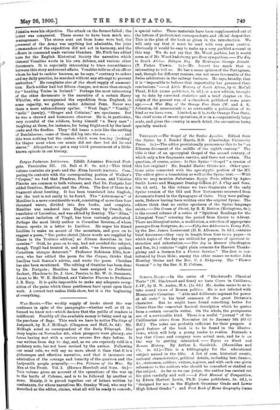Wan-Booxs.—The weekly supply of books about the war continues in
spite of the paragraphs—whether well or ill in- formed we know not—which declare that the public of readers is indifferent. Possibly all the available money is being used up in the purchase of flags. This week we have to notice The Siege of Ladysmith, by R. J. McHugh (Chapman and Hall, 33. 6d.) Mr. McHugh acted as correspondent of the Daily Telegraph. His story begins on November 4th, when prospects were gloomy, our forces having met with a serious reverse five days before. It was written from day to day, and, as we are expressly told in a prefatory note, has not been revised by the author. Following our usual rule, we will say no more about it than that it is a picturesque and effective narrative, and that it increases our admiration of the courage and tenacity of the garrison and the Ladysmith people generally.—Pen Pictures of the War. By Men at the Front. Vol. I. (Horace Marshall and Sons. 6s.)— This volume gives an account of the operations of the war up to the battle of Colenso, and is to be followed by another or more. Mainly, it is pieced together out of letters written by combatants, for whose narratives Mr. Stanley Wood, who may be described as the editor, claims, what all will be ready to concede, a special value. These materials have been supplemented out of the letters of professional correspondents and official dispatches. This is the plan of the book as given in the introduction. We will only say that it must be read with very great caution. Obviously it would be easy to make up a very garbled account in this way. We do not say that Mr. Wood garbles, but it would seem as if Mr. Wood had strong pro-Boer sympathies.—The Kay to South Africa: Delagoa Bay. By Montague George Jessett. (T. Fisher Unwin. ls.)—Mr. Jessett has much that is interesting to tell us. He has a mean opinion of the Portuguese, and, though for different reasons, one not more favourable of the Swiss arbitrators in the railway business. He says, broadly, that it is "impossible to believe that impartiality has governed their conclusions."—A Little History of South Africa, by G. McCall Theal, D.Lit. (same publisher, is. 6d.), is a new edition, brought up to date by corrected statistics and a brief chapter on the origin of the present war, of a class-book published some years ago.—A War Map of the Orange Free State (W. and A. K. Johnston, 6d. unmounted) is as serviceable a publication of its kind as we have seen. Limited, as it is, to the Orange Free State. the chief scene of recent operations, it is on a comparatively late scale, and gives the country in much detail, the encounters being specially marked.






































 Previous page
Previous page